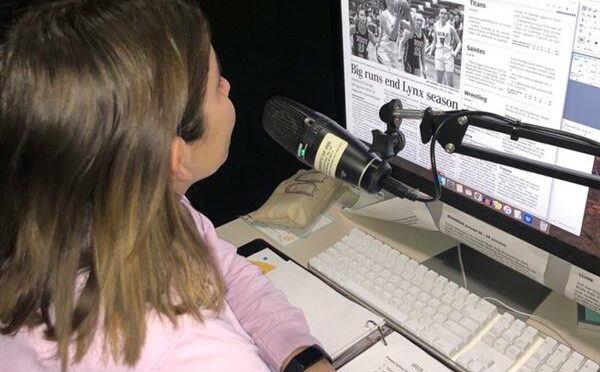As part of Employee Appreciation Month, Human Resources is encouraging everyone to submit a shout-out for a faculty, staff, or student employee. Simply write a sentence of appreciation for a colleague and submit it to Linda Feiden at linda.feiden@drake.edu. Deadline to submit a shout-out is March 24.
Read the shout-outs submitted this week!
“A shout-out to Kristy Hilchen, Amy Nichols, and Valori Bross: You are doing a great job to learn about how to process ‘the world’ for international applications. You are truly All in this Together.” – Teresa Downs
“A shout-out to Austin Higgins: Austin is always friendly and reliable in Student Services and is easy to work with.” – Teresa Downs
“A shout-out to Korrine Jackson: Korrine is one of the most detail-oriented people I have ever met. It is amazing to me how she can keep track of so many different financial components at the same time and make it look so easy.” – Teresa Downs
“A shout-out to Suman Rose: I don’t get to work with you often, but you radiate positivity and a passion for what you do. You inspire me to work harder at my job, and Drake is so lucky to have you!” – Sara Heijerman
“A shout-out to Dan Chibnall, Erica McGowan, Linda Feiden: Thank you for organizing the Drake Book Club! It’s so fun to have a “casual” way to meet co-workers that I don’t normally get to see, and I really appreciate having extra input and help coordinating this “extracurricular” program!” – Sara Heijerman
“A shout-out to Deneen Dygert: I’ve enjoyed working with you this year and am so impressed by your seemingly boundless energy and upbeat attitude. Thanks for being you!” – Sara Heijerman
“A shout-out to Maureen De Armond: I don’t know you well, but I’m so glad you are here! You were an impressive leader of the CWA group, and I can see that you are passionate about your job and making Drake a great place to work. I appreciate you and am looking forward to getting to know you better! – Sara Heijerman
“A shout-out to Annette Watson: Annette Watson successfully hosted the first fully in-person Career networking event in almost two years! The Marketing Speed Networking event was a huge success with more than 128 people participating.” – Chrystal Stanley
“A shout-out to Leah Berte for her stellar work on the PCDS Instagram account. We have seen a tremendous amount of growth this year through her leadership. Her creative opportunities for employers have also expanded our relationship with employers.” – Chrystal Stanley
“A shout-out to Amanda Martin: Amanda is a rock star. She shifted to the new Changemaker Scholars in rapid fashion, and from the outside, she appeared to do it without breaking a sweat (even though we all know what a challenge it was). Well done!” – Chrystal Stanley
“A shout-out to Melissa Sturm-Smith: Melissa has provided strong leadership while also covering for two staff members who were on maternity leave. She did all this with a sense of humor and strength. Drake is lucky to have her.” – Chrystal Stanley
“A shout-out to John Kippes: Professional and Career Development is delighted to partner with John Kippes to serve the students in the John Dee Bright College. We are looking forward to celebrating the first professional experiences this summer.” – Chrystal Stanley
“A shout-out to Ashley Rasmussen: Thank you Ashley for all that you have done and continue to do for the Admin Staff of A&S. Your willingness and availability to answer our questions and lend a listening ear when things are stressful is very much appreciated. You have gone above and beyond on numerous occasions with the transition of new staff and training and in giving us the tools we need to do our jobs well and effectively. Truly an asset to the College of Arts & Sciences and a true model of Drake’s Core Values.” – Alice Fynaardt
“A shout-out to All Staff at Drake University Head Start: It has been a very difficult two years for all of us, but I want to thank you all for working together to keep the children who are enrolled in the Head Start program as safe as possible. I have heard that it takes a village to raise a child and the Drake University Head Start village is the team I would choose every time to help raise my children and grandchildren. Thank you for all you do every day!” – Heidi Ball
“A shout-out to Ron Barry and Kay Zrostlik: Thank you so much for helping to support me and all of the staff at Drake University Head Start. You never complain and always come through! You will never know how much I appreciate my Health and Nutrition Team! You are both the BEST! Thank you! – Heidi Ball
“A shout-out to the entire Drake University Head Start team: We just wrapped up our week-long, on-site federal monitoring review. It was an intense week with lots of questions, interviews, data sharing, monitoring, examination and evaluation, and the ENTIRE staff stepped up and shined bright all week long. The work is not always easy, especially these past couple of years, and yet the staff show up and do great things every day. Thank you is not sufficient.” – Lisa Proctor
“A shout-out to Matt Probasco: Thank you for keeping track of such a gigantic amount of detail to help manage the finances of the University. Drake is better because of you!” – Nate Reagen
“A shout-out to Jenny Tran-Johnson: Thank you for keeping track of all our registered students! The detailed reports that come out of your office have been tremendously helpful in so many ways.” – Nate Reagen
“A shout-out to Tammy Eltayb for the compassion and support she has for her custodial team and all the work they have done during COVID.” – Kevin Moran
“A shout-out to Venessa Macro: Thank you Venessa for assisting me / us with some of our contracts at the Ray Center. Your time and expertise is always appreciated!” – Jason Lamping
“A shout-out to Anne Kremer for tirelessly leading our admission team through all the hard work and strategic thinking to recruit future Bulldogs. The last two years have brought some interesting shifts in recruitment processes and trends, but our team benefits from her leadership, mentorship, and guidance through every step of the cycle.” – Lisa Flynn
“A shout-out to Craig Owens for all the hard work that has been done to lift John Dee Bright College into action. Craig was a committed partner in recruiting our inaugural cohort and continues to advocate for the faculty, staff, and students involved. Seeing the community that has been built has been rewarding, humbling, and certainly paves the way for future students considering Drake and Bright College. Thanks for your leadership!” – Lisa Flynn
“A shout-out to Jenny Jones & Ron Ackerman for being amazing academic advisors for our CBPA graduate students! If you look at their schedules, you’ll quickly realize it’s prime time for advising as these two have appointments back-to-back throughout the day to help fit in appointments for our students. Thank you both for being amazing advocates for our students!” – Dianna Gray
“A shout-out to Betsy Wilson: Betsy is so friendly and always positive. Your joy is infectious. We so appreciate you in the SOE!” – Catherine Gillespie
“A shout-out to Amber Welsh: Amber is professional and thorough and always looks on the sunny side. You balance so much with grace. We appreciate you in the SOE!” – Catherine Gillespie
“A shout-out to Kyle Schura: Kyle is an incredible teammate, employee, and asset to Drake University. He is always willing to go the extra mile to get the job done, and he does it with a smile and laugh. His consistent effort and empathy make working with him a truly positive experience. He has helped the Office of Admission grow and get better in countless ways. I am very appreciative of Kyle, and he is very deserving of a shout out, THANK YOU KYLE!” – Glenn Clark
“A shout-out to Natalie Russell: As Manager, Drake Postal Operations Center, Natalie goes the extra mile to make certain our needs are met at The Robert D. and Billie Ray Center, Home of CHARACTER COUNTS!. She helps us to aim for our goal that every early childhood center in Iowa will receive one of our Early Childhood Kits. And… that’s a lot of kits to be distributed! Natalie has been a joy to work with during this process.” – Deb Taylor
“A shout-out to Grace Wenzel for willingly taking on new tasks and using her creativity for new initiatives. No matter what is asked of Grace, she always happily digs in and helps make progress in the admission space. She is a true Transfer Student Champion and helps her students learn about the Drake experience with an amazing Bulldog vibe! Keep up the excellent work!” –Rachelle Setsodi
“A shout-out to Amy Guiter: Amy joined the Admission team prior to the year and has instantly become an asset. Amy’s attention to detail, professionalism, and caring nature to ensure every visitor’s needs are not only met but exceeded is truly appreciated. As a mother of a student who is navigating her college search, Amy is quite keen to the importance of each interaction and service our office and the campus community provides. Amy is a team player and has forged relationships both in our office and across campus to engage faculty and staff in the important work of recruitment. Drake is very fortunate to have Amy Guiter managing the individual visit program as the Campus Visit Facilitator!” – Deneen Dygert



